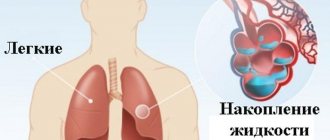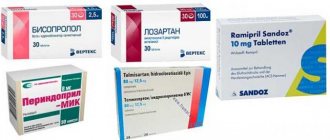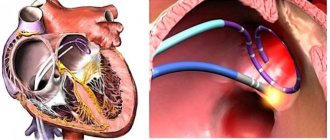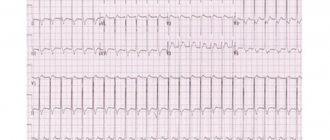Myocardial infarction is the leading cause of death on the planet
Every year, about 18 million people die from cardiovascular diseases worldwide (WHO data). Heart disease is the leading cause of death on the planet. Myocardial infarction is one of the forms of IHD (coronary heart disease), which leads to the formation of muscle tissue necrosis. The cause of the development of the pathology is insufficient blood supply to the area of the heart muscle, resulting from obstruction of the lumen of the coronary artery.
Vessels can become clogged during surgery, atherosclerosis, fat embolism and severe spasm. Risk factors that increase the likelihood of developing myocardial infarction include hypertension, smoking, obesity, alcoholism, physical inactivity, previous infections and psychological stress.
What is heart failure?
Heart failure is a pathological condition caused by the inability of the heart to provide adequate blood supply to organs and tissues during exercise, and in more severe cases, at rest. In heart failure, the heart is not able to effectively pump blood, and therefore the circulation of oxygen and nutrients in the body is disrupted, which leads to stagnation of blood in the tissues, swelling in the legs, in severe cases in the abdominal cavity (ascites), in the lungs . Heart failure is not an independent disease; it is considered a complication of other diseases and conditions. In the United States, heart failure affects about 1% of the population (2.5 million people). Heart failure accounts for one in 20 hospitalizations and is more fatal than many types of cancer. The incidence of heart failure increases with age—10% of the population over 75 years of age in the United States.
Coughing won't help your body.
Recommendations have appeared on the Internet on how to survive a heart attack when no one is around.
The advice is so simple that people actively forward them to each other, post them in chats and generally express delight: they say, thousands of poor people will be saved! Here's what an anonymous online author writes:
“Let's say you're driving home (alone, of course) after a hard day at work. Suddenly you begin to feel severe pain in your chest, which radiates into your arm and up to your neck. How to survive a heart attack when you are alone? What should a person whose heart is beating abnormally, who is starting to weaken and have 10 seconds before losing consciousness, do? And then the author answers his own question: “Don’t panic, but start coughing quickly and very hard. Be sure to take a deep breath before each cough. The cough should be deep and long, expectorating, from the very depths of the chest. Inhalation and coughing should be repeated approximately every two seconds without rest until help arrives or you feel that your heart is beating normally again.
Taking deep breaths brings oxygen to the lungs, while coughing compresses the heart and helps blood circulate. The squeezing pressure on the heart also helps it restore its normal rhythm. This way, the heart attack victim can get to the hospital.”
Can you trust such advice? We asked the director of the Russian Scientific Center of Surgery of the Russian Academy of Medical Sciences, Doctor of Medical Sciences Sergei Leonidovich Dzemeshkevich about this:
“I’m even embarrassed to comment on such nonsense,” said the professor, having become acquainted with the recommendations of the unknown author. - No person is able to determine for himself what such symptoms mean - a developing heart attack or an attack of angina. Sometimes we, specialists, even in intensive care cannot determine this immediately; emergency tests and monitoring of the patient are necessary. Coughing intensely in such a situation is dangerous - during a heart attack, and even more so during a developing heart attack, any stress is dangerous.
What do we have to do?
- Call an ambulance and lie still.
- If the condition worsens and there is nitroglycerin, take one tablet or capsule (put under the tongue, do not swallow!).
- After 5 minutes, and if it doesn’t feel better, take another tablet, you can take a third, but no more.
- After taking nitroglycerin, you should not get up - a sharp decrease in blood pressure may make you dizzy.
- If you see something on the street, at a bus stop, in a store, etc. the person has become ill, do not pass by - call an ambulance, stay with him until the doctors arrive: unfasten the tight collar and belt, if possible, lay him down, provide air access.
What you need to know
— Signs of a heart attack in which you need to call an ambulance: pain in the heart, which can radiate to the arm, shoulder, lower jaw, stomach, as well as a burning sensation behind the sternum.
- Reaction to nitroglycerin. If after taking it the pain and burning sensation do not go away, this is one of the characteristic signs of a heart attack.
- Fear of death. When the heart feels bad, stress hormones are released, triggering an attack of fear. At the same time, the person turns pale and cold sweat appears.
- Most often, a heart attack occurs in the morning, since at this time the production of hormones, in particular adrenal hormones and stress, peaks. In the morning, be more attentive to yourself and your family - if you feel unwell, consult a doctor as soon as possible.
Symptoms of heart failure
When the heart does not work efficiently, people notice that they expend more energy than before when doing the same work, they get tired faster, and experience rapid breathing (shortness of breath). This is due to the fact that the tissues do not receive enough oxygen. Arrhythmias, dizziness, darkening of the eyes, fainting, swelling of the neck veins, pale skin, swelling in the ankle area - which is called edema and is associated with the accumulation of excess fluid in the tissues - may occur. The skin becomes “loose” and if you press on it with your finger, the resulting “dent” or hole remains for quite a long time. As heart failure progresses, the level of edema observed becomes higher; tissue pastiness can be noticed even in the abdomen and lower back.
These symptoms tend to develop gradually and usually go unnoticed for a long time. Symptoms of heart failure increase, the general condition slowly deteriorates and increasingly affects the person's ability to perform normal work. There are often periods when a person's condition remains fairly stable, interspersed at times with episodes of acute worsening of symptoms. In the later stages, complaints arise not only during exercise, but also at rest, and the ability to work is completely lost. Due to insufficient blood supply, all organs and systems of the body suffer to one degree or another. Abnormal heart rhythms are a bad sign of heart failure—about half of people with heart failure die suddenly as a result of fatal arrhythmias.
The main complaints of patients with the development of heart failure:
- Swelling of the soft tissues of the feet and legs are the initial symptoms of right ventricular heart failure, uniformly affecting both legs, occurring in the late afternoon and disappearing by the morning. With the development of insufficiency, the swelling becomes dense and does not go away completely, ordinary shoes become tight, patients feel comfortable only in house slippers.
- Ascites is an accumulation of fluid in the abdominal cavity.
- Enlargement of the liver - discomfort (unpleasant sensations, heaviness) and pain in the right hypochondrium.
- Fast fatiguability.
- Dyspnea is the main, often the first symptom of chronic left ventricular failure. As heart failure progresses, shortness of breath may occur during normal conversation, and sometimes even at complete rest.
- Paroxysmal cough after performing intense exercise.
- Rapid heartbeat (sinus tachycardia) is a feeling of “fluttering” in the chest that occurs during any physical activity.
How to recognize myocardial infarction: symptoms and signs of the disease
The main sign of myocardial infarction is severe chest pain, which can radiate to the left shoulder, neck, ear and interscapular area. The intensity of pain is closely related to the area of damage to the heart muscle. On average, an angina attack lasts from 15 to 60 minutes. In patients with diabetes mellitus, cardiac pathology can be painless.
Additional symptoms of myocardial infarction include arrhythmia, systolic murmurs, weakness, anxiety, and profuse sweating. With large-scale lesions of the heart tissue, a nonproductive cough and shortness of breath appear. Symptoms of myocardial infarction also include sudden cardiac arrest.
Necrosis of an area of muscle tissue leads to fever, which lasts from 3 to 10 days. The patient continues to have signs of heart failure and blood pressure drops. An atypical course of a heart attack occurs in elderly people with severe symptoms of cardiosclerosis and circulatory disorders.
Diagnosis of heart failure
Electrocardiography (ECG) helps doctors identify signs of hypertrophy and insufficient blood supply (ischemia) of the myocardium, as well as various arrhythmias.
An ECG with a load - a special modification of a bicycle (bicycle ergometry) or a “treadmill” (treadmill) - provides information about the reserve capabilities of the pumping function of the heart.
Echocardiography (EchoCG). Using this method, you can not only determine the cause of heart failure, but also evaluate the contractile function of the ventricles of the heart.
X-ray examination of the chest organs in heart failure reveals stagnation of blood in the pulmonary circulation and an increase in the size of the heart cavities (cardiomegaly).
Radioisotope methods for studying the heart, in particular radioisotope ventriculography, make it possible to assess with high accuracy the contractile function of the ventricles of the heart and the volume of blood they contain in patients with heart failure. These methods are based on the administration and subsequent distribution of radioisotope drugs in the body.
Positron emission tomography – PET – allows using a special radioactive “tag” to identify areas of viable myocardium in patients with heart failure.
Providing first aid for myocardial infarction
When symptoms of a heart attack appear, the patient should be placed in a reclining position with knees bent or seated on a chair with a backrest. You should also loosen buttons, loosen ties, and loosen tight clothing. After this, you need to call an ambulance. Nitroglycerin can only be given if you have high blood pressure. If the patient has hypotension, then the drug should not be used. Taking nitroglycerin in the presence of low blood pressure can lead to the development of collapse. If the patient is not allergic to aspirin, then you need to give him 300 mg of this medicine.
The tablet must be chewed and washed down with water. In this case, it will act quickly. In case of cardiac arrest, loss of consciousness and agonal breathing, cardiopulmonary resuscitation should be started immediately.
Treatment of heart failure
If acute heart failure develops, hospitalization is necessary. The main emphasis in treatment is both on eliminating the causes of heart failure (stress, excessive consumption of table salt, alcohol abuse, smoking, high blood pressure, as well as taking medications that promote fluid retention in the body, etc.), and on correcting it manifestations. Limiting physical activity. Physical activity is acceptable and desirable, but it should not cause significant fatigue or discomfort. The diet should be low in salt, with plenty of fruits and vegetables. It is very important to achieve a reduction in excess weight, as it creates a significant additional burden on a diseased heart.
Currently, the following medications are used to treat heart failure:
- increased myocardial contractility;
- decreased vascular tone;
- reducing fluid retention in the body;
- elimination of sinus tachycardia;
- prevention of thrombus formation in the cavities of the heart.
If medications used to treat chronic heart failure are ineffective, surgical treatment may be recommended - cardiomyoplasty, cardiac pacing. Typically, medical monitoring of patients with heart failure is necessary throughout their lives.
Prevention of complications and treatment of myocardial infarction
You can make an appointment for a fee with a cardiologist in Yekaterinburg by calling: +7 (343) 228-11-28 or through the clinic’s website.
Cardiologists at the Family Clinic use the latest scientific advances in the diagnosis and treatment of cardiovascular pathologies. Doctors constantly attend seminars and conferences devoted to the problems of treating myocardial infarction. We work with all age groups. To make an appointment, call the contact number or send an email.









